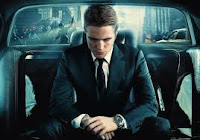This is my second David Cronenberg film in the space of a couple of weeks; I think I need a lie down. I watched eXistenZ a few weeks ago and that was weird enough. After seeing Cosmopolis last night eXistenZ feels like a breezy walk in the park - at least eXistenZ has a vaguely linear plot running through its craziness.
On the surface, Cosmopolis can be summed up in the following way. Robert Pattinson plays Eric Packer, a highly-flying and extremely powerful businessman who takes a ride in his limo across the city (I guess it's New York) in search of a hair cut. On the way he meets a variety of people, some of whom he talks to in his limo, others of whom he steps out and meets in bars, cafes, libraries etc. Each of these people is quite different, but the connection is that each impacts his life in a different way and speaks to him in quick-fire poetic stanzas about something philosophical. Time moves in strange ways in the limousine as day quickly turns to night. Protesters appear outside the car, but still people appear within it to lecture Packer on the meaning of the modern world. What does it mean to have power? What is money? Why do we think of time the way we do? All these and others are questions that are either posed outright or hinted at in a whirlwind of hard-to-penetrate dialogue over 100 minutes.
It is very hard to watch Cosmopolis. There is nowhere to take an intellectual break from what's being said, hardly a moment of reflection in which to digest what's going on. Visually the film is tough, with odd lighting effects making the world outside the car appear ethereal and distant. At the same time it isn't any fun watching Cosmopolis, as you feel like you're being lectured by someone much cleverer than you, who's constantly watching you, waiting for you to show any sign of failing to understand the full depth of what it is they're saying.
Despite this though, it's a film about which you can have a very long conversation with your fellow movie-goer. Cronenberg seems to be trying to create some sort of treatise on the recent fall of Western Capitalism. I'm guessing that Pattinson's character is a metaphor for American Capitalism, on a journey somewhere for no apparent reason, a violently destructive force that projects power (in the film sex seems to be a metaphor for power) and is in a terminal decline. At the same time he is surrounded by a series of advisers who tell him about the creeping influence of technology on society and how what he does affects so many people's lives, but ultimately they can't actually help him. Pattinsons wife (Sarah Gadon) is perhaps a metaphor for the state, ever-present and stoic, aware of what Capitalism wants and happy to prop it up when it reaches its low ebb, but equally happy to roll over when Capitalism appears strong. Paul Giamatti's character could represent the masses, full of rage about something but not knowing how to use the weapons at their disposal or how to direct their anger if they could; they're desperate to be free of Capitalism but terrified of what will happen without it.
Maybe. Maybe not.
Essentially Cosmopolis is pretentious wank. But at least it's vaguely interesting pretentious wank. Plus it's good to see that Robert Pattinson has no desire to confine himself to a career borne out of the Twilight silliness. I can't bring myself to recommend Cosmopolis, mainly because I didn't actually enjoy watching it. I can think of better ways to spend 100 minutes if all you want to do is come up with fodder for a philosophical debate on the connection between the post-modern world, capitalism and the Occupy protests. This is the sort of film that would have had a tiny release in London arthouse cinemas were it not for the appearance of Pattinson. At least now I'm sure of something I suspected though, that David Cronenberg is a mentalist.
Subscribe to:
Post Comments (Atom)

No comments:
Post a Comment